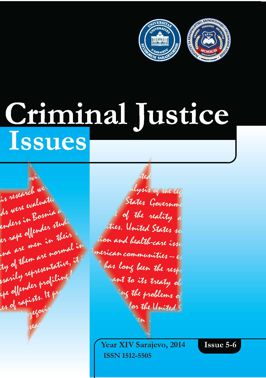TRAFFICKING IN HUMAN BEINGS IN BOSNIA AND HERZEGOVINA: STATE OF THE ART AND ASSOCIATED PUZZLES
TRAFFICKING IN HUMAN BEINGS IN BOSNIA AND HERZEGOVINA: STATE OF THE ART AND ASSOCIATED PUZZLES
Author(s): Samir Rizvo, Eldan MujanovićSubject(s): Criminal Law, Human Rights and Humanitarian Law, Criminology, Studies in violence and power, Victimology
Published by: Fakultet za kriminalistiku, kriminologiju i sigurnosne studije Univerziteta u Sarajevu
Keywords: trafficking in human beings; exploitation; patterns; response;
Summary/Abstract: Reason(s) for writing and research problem(s): The reason for writing this paper is to research and to shed light on the phenomenon of trafficking in human beings in Bosnia and Herzegovina, elaborate its history, the state of the art, and the exploitation patterns of trafficking. Aims of the paper (scientific and/or social): The aim of the research is social, targeted on identification of shortcomings that lead to underestimation of the problem, which preclude efforts to develop effective responses to this crime and brutal violations of victims’ human rights. Methodology/Design: The methodology is based on the secondary data and findings from various reports, studies and theoretical debates. Research/paper limitations: Limitations of the paper are related to the fact that official statistics do not reflect the scale of the problem, due to misinterpretations and lack of the mechanisms to identify victims of new forms of trafficking, other than for sexual exploitation, like labour exploitation, forced begging and commission of petty crimes, fake marriages, removal of organs for transplantation. Results/Findings: Findings indicate that there are gaps in the mechanism for suppressing trafficking. The findings have important implications for anti-trafficking policies and legislation by trying to improve public and governmental understanding of the magnitude and complexity of the problem. General conclusion: The secondary data analysis has shown a lack of: vigorous investigation of sex and labour trafficking cases; aggressive prosecution and punishment of trafficking of-fenders; effective suppression of corruption related to trafficking in human beings; insufficient proactive approach and outreach work on identification of potential victims of trafficking; low levels of public awareness of trafficking in human beings; and absence of any relevant research for a long time which should identify scope and trends as well as factors that support and facilitate trafficking in human beings in Bosnia and Herzegovina. Research/paper validity: This paper points out shortcomings that can lead to an underestimation of the problem of trafficking in human beings in Bosnia and Herzegovina and highlight the research questions to be explored in future studies in Bosnia and Herzegovina.
Journal: Kriminalističke teme – Časopis za kriminalistiku, kriminologiju i sigurnosne studije
- Issue Year: XIV/2014
- Issue No: 5-6
- Page Range: 75-93
- Page Count: 19
- Language: English

